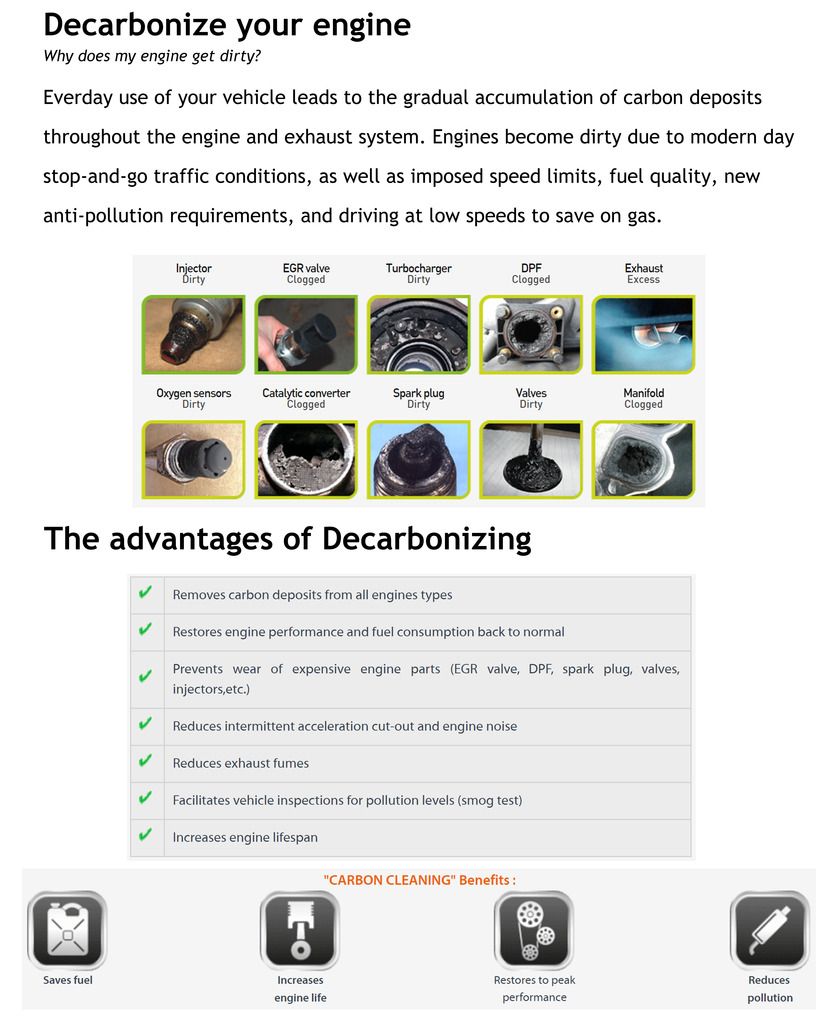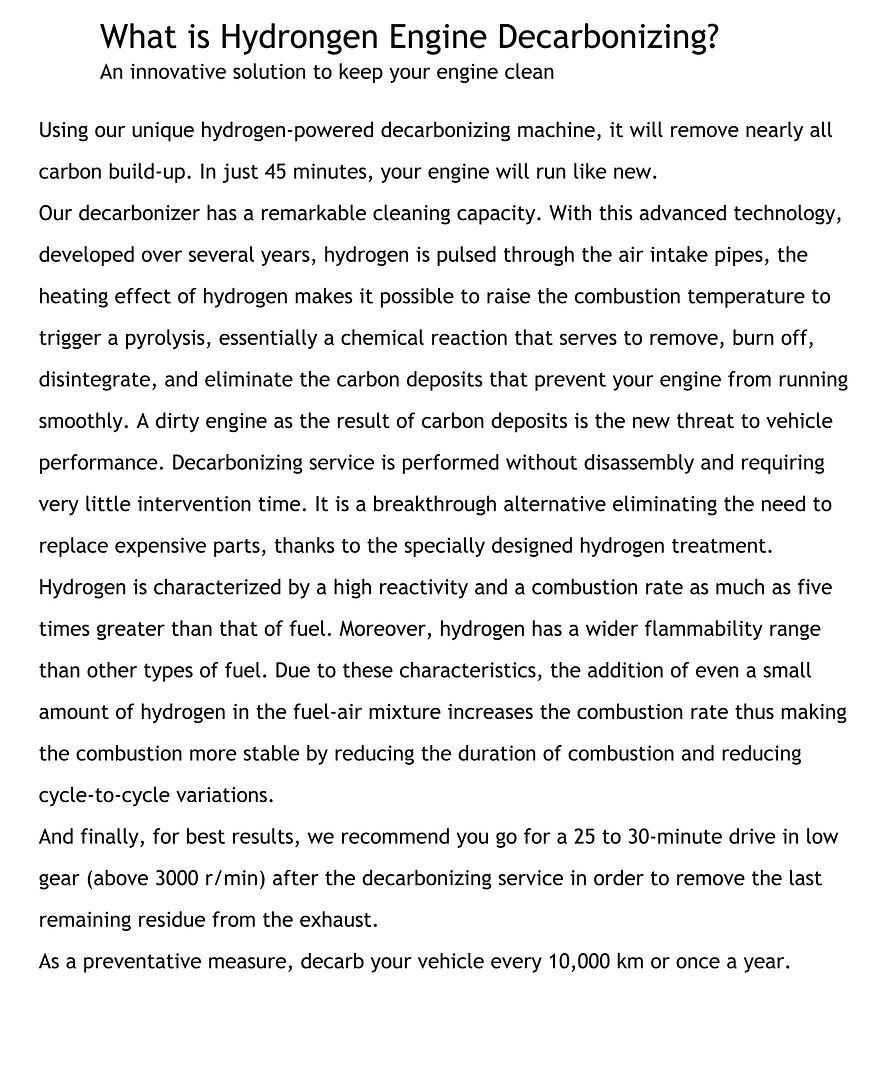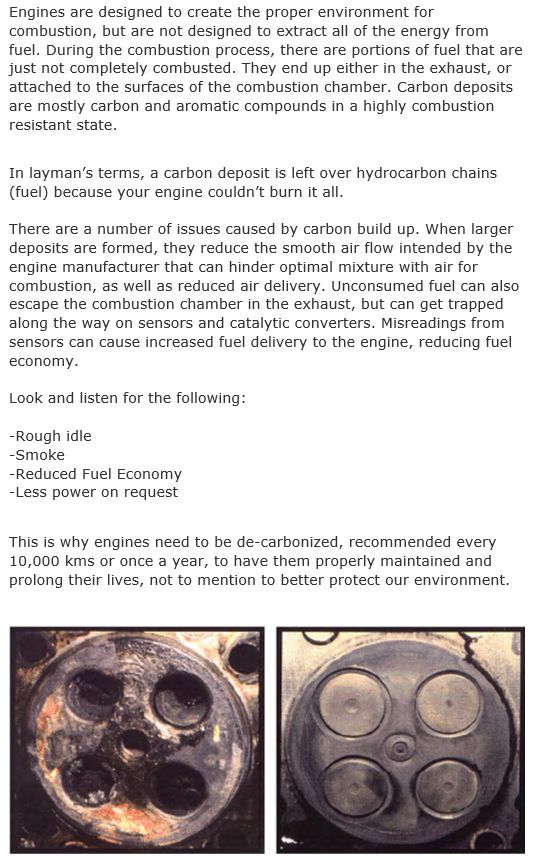Results 1 to 10 of 12
-
 Verified Tsikot Member
Verified Tsikot Member

- Join Date
- Apr 2016
- Posts
- 14
-
 Verified Tsikot Member
Verified Tsikot Member

- Join Date
- May 2008
- Posts
- 329
-
April 16th, 2016 07:59 PM #3
I think you will get a reply fast from their fb.
10,000km decarb is bullshizt
Carbon deposit dont grow that fast lol..
High mileage engines will benefit though.
-
April 16th, 2016 09:58 PM #4
-
 Verified Tsikot Member
Verified Tsikot Member

- Join Date
- Apr 2016
- Posts
- 14
April 17th, 2016 12:33 AM #5Thanks for sharing guys, actually it is recommended to de-carbonize your vehicles every 10,000 kms or once a year, but it still depends on different situations and owner's free will. If you run 10,000 kms mainly on highway, then it is absolutely true that little carbon will accumulate in your engine. On the other hand, if all 10k is spend on daily bumper-to-bumper mad traffic, then lots of carbon deposit will build up and stay inside, a decarb in this case will surely benefit the performance and lifespan of your engine. Once again, 10k is just a recommendation and really case to case basis, it's up to the owner's observations of the their vehicle's conditions.
-
 Verified Tsikot Member
Verified Tsikot Member

- Join Date
- Apr 2016
- Posts
- 14
-
April 17th, 2016 12:40 AM #7
Masyado maaga magpa decarb at 10,000kms. May sinasabi pang or at least once a year? Recommended nino? Recommended ng mga nag dedecarbonize para tuloy ang kita? Mas mahaba na nga dapat interval since Euro 4 fuels na tayo kahit papano mas malinis na combustion.
May nakita din ako sa Shop sa FB na ni rerecommend ang mga diesel users para palitan Fuel Filter at Air filter every 5,000kms hehe.
-
 Verified Tsikot Member
Verified Tsikot Member

- Join Date
- Apr 2016
- Posts
- 14
-
 Tsikoteer
Tsikoteer

- Join Date
- Aug 2012
- Posts
- 2,767
April 17th, 2016 01:45 PM #9Why NOT Decarbonise?
The first & main reason could be: Why fix something that isn't broken? There are innumerable examples of cars running perfectly well beyond 200,000 kms WITHOUT engine decarbonisation. A perfectly timed maintenance schedule is key.
Does your engine really need to be decarbonised? The symptoms of heavy carbon deposit include pre-ignition (akaknocking) and an increase in cylinder compression pressure (above the recommended values).
21st century engines & newer technology mean that fuel is burnt inside an IC engine more completely and efficiently than ever before. Complete combustion = no carbon deposit.
Decarbonising may improve performance temporarily, but it won't address the reason for such deposits - usually over-fueling, or lubricating oil rising to the top of the pistons. You need to fix the injector / fuel pump settings to prevent carbon deposits in the first place, not clean it up afterwards! If your oil control rings aren't doing their job and you have engine oil coming up to the upper cylinder / top of piston, you need to have new rings / an engine overhaul done. Removing the carbon by decarbonising can actually worsen oil control in this situation.
Fuel additives which are added directly to the tank have some role in cleaning out carbon deposits (they also help in avoiding carbon buildup). These are way cheaper than decarbonising using a machine.
Engine Decarbonising - Demystified - Team-BHP
Sent from my D5833 using TapatalkLast edited by red_one; April 17th, 2016 at 01:48 PM.
-
 Verified Tsikot Member
Verified Tsikot Member

- Join Date
- Apr 2016
- Posts
- 14







 Reply With Quote
Reply With Quote






As expected, in response to Tesla’s entry into the Philippines market, Ford will be bringing in the...
Tesla Philippines